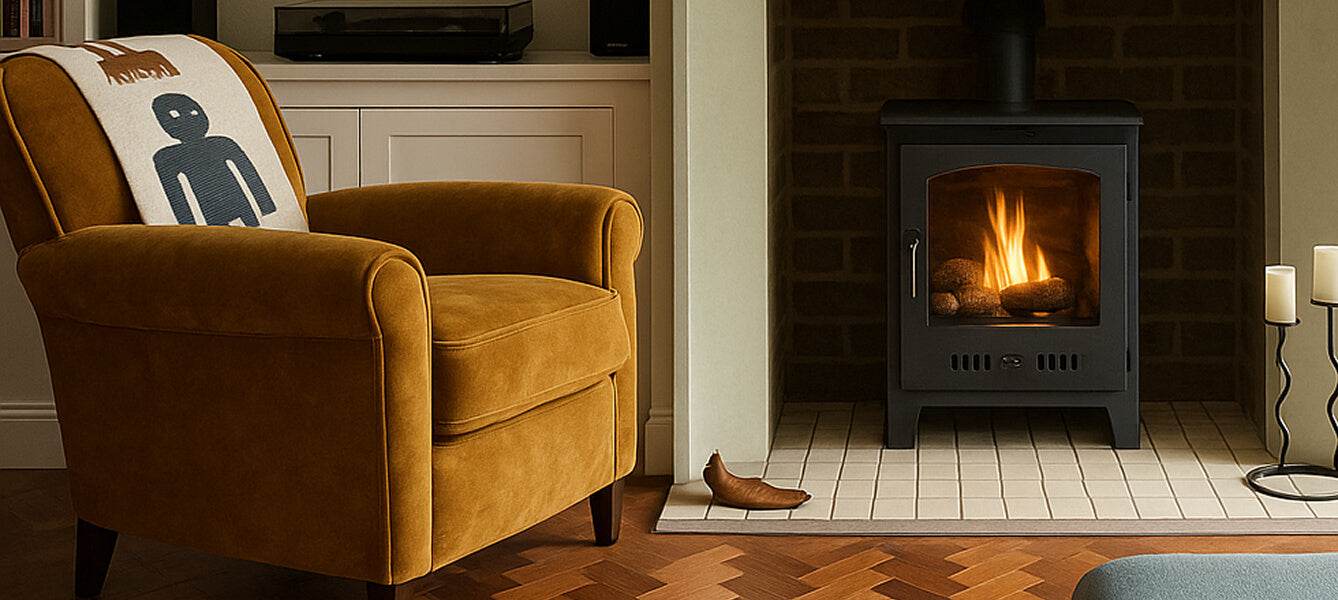
Bioethanol vs Ethanol: What’s the Difference (and Why It Matters for Your Fireplace)
Looking to invest in a greener type of fireplace that doesn’t depend on fossil fuels? During your research, you might have stumbled upon the terms bioethanol and ethanol. At first glance, they may appear interchangeable – but it’s important that you understand the difference between the two before deciding which type of fireplace is right for your home.
We explore everything you need to know about bioethanol vs ethanol, so you can feel confident in choosing the right fuel for your fireplace.
What is ethanol?
Ethanol is a type of alcohol, sometimes referred to as ethyl alcohol. It’s a clear, colourless liquid that is most commonly used in fuel, industrial processes, and beverages (i.e. wine, beer, and spirits).
It can be produced in two ways:
-
Natural fermentation – sugars from crops such as sugarcane or maize are fermented to create alcohol
-
Synthetic production – ethanol can be manufactured from petrochemical feedstocks, which are usually derived from fossil fuels
All ethanol is chemically the same (C₂H₅OH), but the way it is produced has a big impact on its environmental footprint. You can discover more about the ethanol production process via the official RFA website.
What is bioethanol?
Simply put, bioethanol is ethanol made from renewable biological sources. It’s typically produced by fermenting the sugars and starches that are found in plants such as corn, sugarcane, potatoes, or even waste biomass. Unlike synthetic ethanol, bioethanol is derived from plants that can be regrown, meaning it is a renewable fuel source. This makes it a far more sustainable option for your fireplace fuel.
At imaginfires, we supply a wide range of bioethanol fireplaces that exclusively use clean-burning bioethanol fuel. They produce no smoke, soot, or ash; just small amounts of CO₂ and water vapour, similarly to lighting a couple of tealight candles. This makes them perfectly safe for indoor use, without needing to install a chimney or flue. You can read more about bioethanol fuel emissions in our FAQ.
Does bioethanol smell different from ethanol?
One of the most common questions that people ask us is whether bioethanol fuel has an odour. As we explain in our guide to bioethanol fuel odour, high-quality bioethanol burns with minimal smell. You might smell a faint odour similar to a candle being extinguished, but it’s nothing compared to the heavy smoky smell that comes from burning wood or coal.
On the other hand, synthetic ethanol can release much stronger chemical smells, depending on how it’s been produced and what additives have been included. Sticking with clean-burning bioethanol ensures your house remains smelling fresh, without any nasty chemical odours.
Bioethanol vs synthetic ethanol differences
In summary, here are the main differences between bioethanol vs ethanol:
|
Bioethanol |
Ethanol |
|
|
Origin |
Produced from crops and other organic matter |
Made from fossil fuels such as petroleum derivatives |
|
Sustainability |
Renewable and eco-friendly, as new crops can be planted to replace those used |
Relies on non-renewable resources, has a higher carbon footprint |
|
Smell |
Burns with minimal odour, similar to a candle being extinguished |
Can produce stronger chemical smells depending on the production process and additives used |
|
Suitability for fireplaces |
Specifically recommended for domestic fireplaces as it’s safe, efficient, and clean-burning |
Not intended for home combustion, may not meet the same purity standards for safe indoor burning |
Why bioethanol is the superior choice for your fireplace fuel
Choosing the right fuel has a huge impact on the safety, sustainability, and overall experience of using your fireplace. Bioethanol delivers on all these fronts, making it the superior choice for your next fireplace fuel.
Bioethanol is perfect for indoor domestic fireplaces, as it burns without releasing any harmful emissions, smoke, or strong odours. By investing in a bioethanol fireplace, you can rest assured that every fire you light will be safe, clean, and free from the hidden nasties that come with traditional fuels.
Beyond air quality, bioethanol also has clear environmental advantages. As it’s made from renewable resources, it helps to reduce your reliance on fossil fuels and lowers your household’s carbon footprint. Choosing bioethanol as your fuel of choice means you’re not only cutting back on carbon-heavy energy sources but also actively supporting a more sustainable, environmentally conscious way of living.
Experience all the benefits of bioethanol with imaginfires
Enjoy all the charm and warmth of a traditional fire in a safer, cleaner, and greener way with our impressive range of British-made bioethanol fireplaces. Each of our fireplaces is powered by our clean-burning, high-quality bioethanol fuel, allowing you to experience all the benefits of a real fire without the drawbacks.
Explore our full range of bioethanol fireplaces and discover why so many UK households are making the switch.
